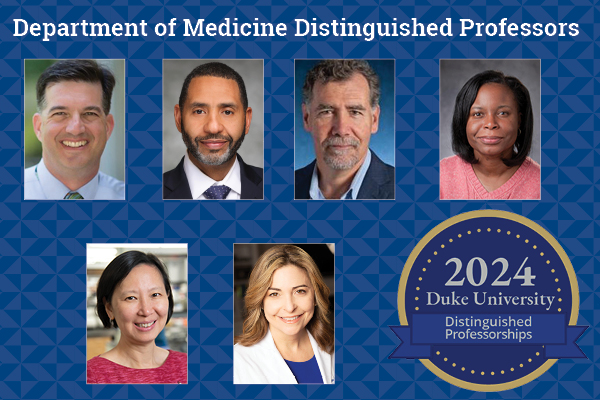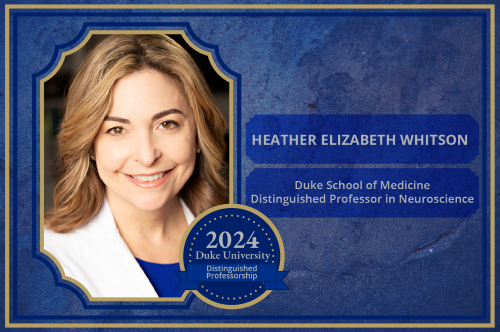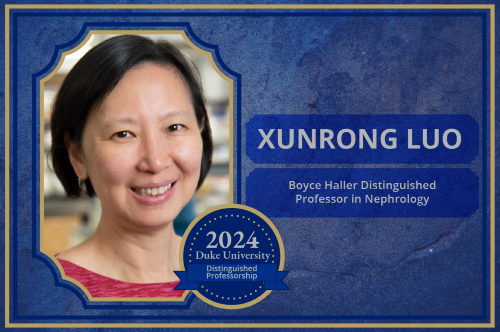
Duke University has awarded Distinguished Professorships to 32 faculty members, six from the Department of Medicine: Michael Pignone, MD, Vice Chair for Quality and Innovation, Professor of Medicine; Kevin Thomas, MD, Vice Dean for Equity, Diversity and Inclusion and Chief Diversity Officer, Professor of Medicine; Kimberly Sherell Johnson, MD, Professor of Medicine, Geriatrics; Xunrong Luo, MD, PhD, Professor of Medicine, Nephrology; Heather Elizabeth Whitson, MD, Professor of Medicine, Geriatrics; Christopher Beyrer, MD, Professor of Medicine, Infectious Diseases.
Distinguished Professorships recognize faculty scholars who are well-established members of the Duke academic community who have also achieved distinction as creative scholars in their field or in their ability to transcend disciplines.
Over the coming weeks, join us in recognizing these Distinguished Professors through our Distinguished Professor Spotlight.
This week, we feature Heather Whitson, MD and Xunrong Luo, MD, PhD.
Heather Whitson, MD, Distinguished Professor in Neuroscience
Tell us about your clinical, academic, or research interest and why you are passionate about this topic or area of focus.
My professional goal is to improve outcomes and care options for all people as they age. I have a particular focus on how aging biology and multiple chronic conditions affect the brain. Alzheimer’s disease and other neurodegenerative dementias are devastating for many patients and families, and there is no proven prevention or cure. I believe that our best chance to understand the main drivers of neurodegeneration – and to prevent or delay the onset of dementia – is to study individuals in middle-life who are at risk for dementia, but before cognitive changes emerge. My colleagues and I are seeking to understand the age-related changes across the lifespan that trigger Alzheimer’s disease pathology or render our brains less resilient to insults as we age.
Who has influenced you the most in life and why?
The person who has influenced me the most is my mother. She grew up in the Deep South, in a time when career options for women were limited. While still working full-time as a teacher, she started part-time graduate school when I was in elementary school. I’m grateful that I got to ride shotgun as her career advanced, so I could bear witness to the late nights and competing demands that were part of the journey. She experienced sexism rarely in higher education, but some instances were blatant and unfiltered in ways that would be shocking today; I’m glad I was privy to those, too. My mother achieved her dream of becoming president of a women’s college the same year that I came to Duke to begin my internship. I am thankful for my mother’s example of grit, courage, can-do attitude and choosing the right life partner (both my dad and my husband are kings among us). I appreciate all the pioneers and trailblazers who lit the way for my own STEM career.
Xunrong Luo, MD, PhD, Boyce Haller Distinguished Professor in Nephrology
Tell us about your clinical, academic, or research interest and why you are passionate about this topic or area of focus.
I am a clinical transplant nephrologist whose research focuses on mechanisms for establishing and maintaining immune tolerance in organ transplantation. The ultimate goals of my research are to eliminate organ rejection and the need for lifelong immunosuppressant drugs, increase the longevity of transplanted organs, and alleviate the shortage of donor organs for transplantation. Expanding the scope of kidney transplantation is the reason why I am passionate about my research.
What do you view as the biggest challenge to the field of medicine going forward and how can we address it?
I view the incorporation of artificial intelligence into the field of medicine and medical research as the biggest challenge going forward. This would require medical researchers and artificial intelligence experts to work closely with each other to generate systems that can model complicated human biological processes for efficient studies of disease mechanisms and targeted therapeutics.